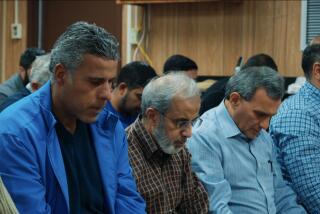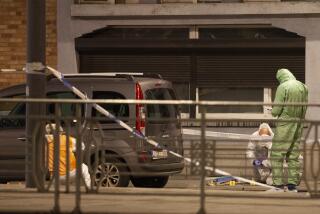Moderation May Have Proved Fatal to Muslim Cleric
BRUSSELS â The shy, bespectacled leader of Sunni Muslims in three countries, Abdullah Ahdal was no fanatic. Indeed, he demonstrated his moderate beliefs in his private life. He often wore Western suits and met regularly with Western diplomats. He even sent his children to Roman Catholic schools rather than to one of the several Islamic academies here.
That moderation may have been the death of him, Belgian authorities said Thursday.
Ahdal, 36, and an assistant, Salim Behir, 40, were shot and killed Wednesday night in the office of the cityâs largest mosque, and Belgian officials said the professional killings were almost certainly linked to his position on the controversy surrounding author Salman Rushdie and his book, âThe Satanic Verses.â
A police spokesman revealed Thursday that Ahdal, spiritual head of the mosque and of Muslims throughout Belgium, the Netherlands and Luxembourg, began receiving death threats March 24 after he made a series of moderate public statements regarding the Iranian death sentence against Rushdie.
In a recent television appearance, for example, Ahdal had criticized Rushdieâs novel, which many Muslims regard as blasphemous and insulting to their religion. But he said he was opposed to the call on Muslims by Iranâs Shiite Muslim leader, the Ayatollah Ruhollah Khomeini, to kill the author and everyone connected with publishing and selling the novel.
âWe live here in a democratic country,â said Ahdal, a native of Saudi Arabia, âwhere each person has the right to say and think and express themselves as they want.â
Represented Mainstream
In this, Ahdal represented the attitudes of the moderate mainstream here, a mostly Sunni Muslim community.
Except for a brief flurry of activity during anti-U.S. demonstrations in 1986, after the American bombing raids on Libya, there has been little evidence of a significant fundamentalist Muslim presence here.
âI canât believe these killings were done by Belgian Muslims,â said Yohan Leman, an anthropologist and expert on the North African Arab communities in Brussels. âI think the killers had to come from outside.â
Brussels has one of the largest concentrations of Muslim immigrants in Europe, more than 150,000 out of a population of 1 million. North African women in scarfs and ballooning pants stroll the cobblestone streets of several sprawling neighborhoods. Mustachioed Turkish men drink mud-like coffee in all-male cafes. More than 30 mosques call the faithful to prayer.
In some neighborhoods, such as Sant-Josse near the headquarters of the European Commission and Molenbeek on the western side of the city center, Arabs and Turks exceed more than 50% of the population. Forty percent of the births in Brussels now occur in these immigrant families. In some areas, 65% of the school children are immigrants.
The Muslim community reacted with shock, rage and tears to the slayings Thursday.
âNearly everyone was weeping during the evening prayers,â said Abdullah Amid, one of the worshipers at the tiny El Azhar mosque in the mostly Moroccan Sant-Josse. âThose not showing tears outside were weeping inside with wounded hearts.â
âThe killings were a shameful stupidity,â said Arab taxi driver Achour Derkaoui. âWhat they did was against the teachings of the Koran.â
Ahdal was a respected, if not widely known figure in the community. He spoke classical Arabic and no French, which limited his access to the Arab immigrants from North Africa. However, he was the only Muslim leader officially recognized by the Belgian government, and he was directly involved in Muslim education in the state-supported schools, which have included instruction about Islam in their curriculum since 1975.
On this level, Ahdal will be sorely missed as an arbitrator between the Muslim community and the government.
However, his relatively liberal ideas were not universally acclaimed in the community. A petition against his stance on Rushdie had drawn nearly 300 signatures. On the eve of his assassination, he met with other Muslim leaders, including a former religion education director at the mosque, to hear their criticism of his position.
After the telephone threats against Ahdalâs life, a police official said, a âdiscreet surveillanceâ was placed around the large World Islamic League mosque in the cityâs Cinquantenaire Park. Ahdal, his wife and six children lived in an apartment attached to the mosque.
Officials could not explain how a lone assassin using a 7.65-millimeter pistol managed to slip into the mosque and kill Ahdal and librarian Behir, first firing into the nape of the neck and then into each manâs temple. The killer escaped undetected shortly after evening prayers Wednesday.
âIn the wake of the assassination,â Deputy Prime Minister Willy Claes said in a press conference Thursday, âprotection measures have been immediately increased. Police have been asked to make preventive patrols to assure the necessary protection to the Islamic community and contribute to the peace of mind in that community.â
But crude graffiti painted on the walls of a monument adjacent to the mosque illustrated the underlying tension that exists here between the Muslim community and many native Belgians.
âArabs Have Four Paws,â said one of the painted slogans. âArabs Go to Mecca!â said another.
For many Muslims, the killings raise fears that the rest of Brusselsâ population, including native Bruxellois and other immigrants, will become even more resentful and fearful of their Muslim neighbors.
âThe killings have augmented the tension that already existed here,â said Haslaoui Rabah, 37, director of a Brussels Arabic-language radio station. âThey had the effect of pouring gasoline on the fire.â
More to Read
Sign up for Essential California
The most important California stories and recommendations in your inbox every morning.
You may occasionally receive promotional content from the Los Angeles Times.










